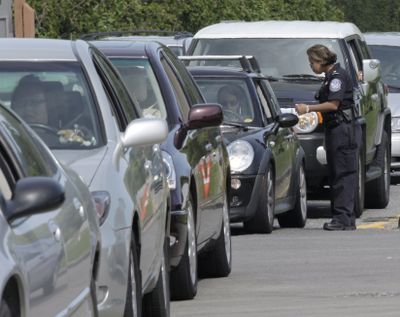Border-town businesses wary of U.S. entry fee
Homeland Security wants to study effect

BELLINGHAM – In an effort to raise more money for border protection and inspection, the U.S. Department of Homeland Security wants Congress to authorize the study of a fee that could be collected from everyone who enters this country at land crossings.
The DHS 2014 budget proposal seeks increases in existing fees charged for a variety of customs and immigration services, such as the fees that air and sea travelers pay when they enter the country.
But until now, no fees have been imposed on those who enter by car, bus or train. Some land border crossings, such as those in Detroit and Buffalo, use toll bridges, but the toll money goes to bridge operators, not DHS.
DHS wants to take a step toward changing that, seeking an unspecified sum for “assessing the feasibility and cost relating to establishing and collecting a land border crossing fee for both land border pedestrians and passenger vehicles along the northern and southwest borders of the United States.”
The budget request says the study should consider a fee that could be added to existing tolls in places like Detroit and Buffalo, or to ticket prices for those arriving by bus or train. But DHS also wants to take a look at collecting fees at “land ports of entry where existing capability is not present,” which would include the Blaine, Lynden and Sumas crossings in Whatcom County, Wash.
Ken Oplinger, president of the Bellingham/Whatcom Chamber of Commerce and Industry, said that would be a negative for the Canadian shoppers who support local businesses. Besides the fee itself, the collection of the fee would likely add to border crossing times.
“It would certainly dampen the desire by the Canadians to come south,” Oplinger said. “What sort of loss to local revenues is that going to cause?”
Oplinger was skeptical that a border fee would be a good way for the feds to recover border costs. Reducing the flow of retail and tourist dollars across the border would have an indirect impact on federal tax revenues as well, he said.
Viet Shelton, spokesman for U.S. Rep. Suzan DelBene, said the congresswoman takes a dim view of the idea as well. He said DelBene, a Democrat who represents part of Whatcom County, thinks DHS should be studying ways to make the border more secure and efficient.
“We shouldn’t be studying ways to make it more onerous and hard,” Shelton said, noting that the imposition of such a fee is still a long way from reality and Congress may choose not to approve the study.